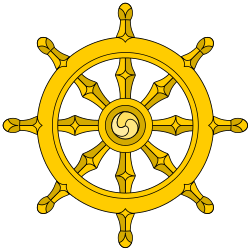Anāgāmi
| Part of a series on |
| Buddhism |
|---|
 |
|
In Buddhism, an anāgāmi (Sanskrit and Pāli for "non-returning")[1] is a partially enlightened person who has cut off the first five chains that bind the ordinary mind. Anāgāmis are the third of the four aspirants.
Anagamis are not reborn into the human world after death, but into the heaven of the Pure Abodes, where only anāgāmis live. There they attain full enlightenment (arahantship).
The Pali terms for the specific chains or fetters (Pali: saṃyojana) of which an anāgāmi is free are:
- Sakkāya-diṭṭhi: Belief in atmān or self
- Sīlabbata-parāmāsa: Attachment to rites and rituals
- Vicikicchā: Skeptical doubt
- Kāma-rāga: Sensuous craving
- Byāpāda: ill will
The fetters from which an anāgāmi is not yet free are:
- Rūparāga: Craving for fine-material existence (the first 4 jhanas)
- Arūparāga: Craving for immaterial existence (the last 4 jhanas)
- Māna: Conceit
- Uddhacca: Restlessness
- Avijjā: Ignorance
Kāmarāga and Byāpāda, which they are free from, can also be interpreted as craving for becoming and non-becoming, respectively. Anāgāmis are at an intermediate stage between sakadagamis and arahants. Arahants enjoy complete freedom from the ten fetters. An anāgāmi's mind is very pure.
See also
Notes
- ↑ Rhys Davids & Stede (1921-25), pp. 31, 95, entries for "Anāgāmin" (retrieved 26 Sep 2007 at http://dsal.uchicago.edu/cgi-bin/philologic/getobject.pl?c.0:1:735.pali) and "Āgāmin" (at http://dsal.uchicago.edu/cgi-bin/philologic/getobject.pl?c.0:1:2587.pali).
Sources
- Thomas Rhys Davids & William Stede (eds.) (1921-5). The Pali Text Society’s Pali–English Dictionary. Chipstead: Pali Text Society. A general on-line search engine for the PED is available at http://dsal.uchicago.edu/dictionaries/pali/.